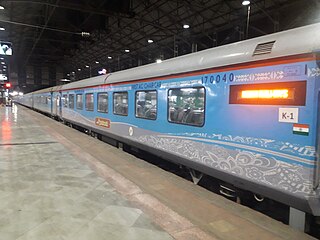Related Research Articles

Rail transport in India consists of primarily of passenger and freight shipments along an integrated rail network. Indian Railways (IR), a statutory body under the ownership of the Ministry of Railways of the Government of India, operates India's national railway system. It is the primary owner and operator of rail operations throughout the country including suburban rail in major metros.

First class is the most luxurious and most expensive travel class of seats and service on a train, passenger ship, airplane, bus, or other system of transport. Compared to business class and economy class, it offers the best service and most comfortable accommodation.

Indian Railways (IR) is a statutory body under the ownership of the Ministry of Railways of the Government of India that operates India's national railway system. As of 2023, it manages the fourth largest national railway system by size with a running track length of 104,647 km (65,025 mi) and route length of 68,426 km (42,518 mi) of which 60,451 km (37,563 mi) is electrified. With more than 1.2 million employees, it is the world's ninth-largest employer and India's second largest employer.

A travel class is a quality of accommodation on public transport. The accommodation could be a seat or a cabin for example. Higher travel classes are designed to be more comfortable and are typically more expensive.
A passenger name record (PNR) is a record in the database of a computer reservation system (CRS) that contains the itinerary for a passenger or a group of passengers travelling together. The concept of a PNR was first introduced by airlines that needed to exchange reservation information in case passengers required flights of multiple airlines to reach their destination ("interlining"). For this purpose, IATA and ATA have defined standards for interline messaging of PNR and other data through the "ATA/IATA Reservations Interline Message Procedures - Passenger" (AIRIMP). There is no general industry standard for the layout and content of a PNR. In practice, each CRS or hosting system has its own proprietary standards, although common industry needs, including the need to map PNR data easily to AIRIMP messages, has resulted in many general similarities in data content and format between all of the major systems.

Shatabdi Express are a series of fast passenger trains operated by Indian Railways. Shatabdi Express are day trains and mostly return to their origin station the same day. The trains were first introduced in 1988 and were named 'Shatabdi', meaning 'century', to commemorate the birth centenary of India's first Prime Minister Jawaharlal Nehru. The trains run at a maximum permissible speed of 110–150 km/h (68–93 mph) with the Rani Kamalapati–New Delhi Shatabdi Express achieving the maximum permissible speed of 150 km/h (93 mph) between Tughlakabad and Bilochpura Agra.

Indian Railway Catering and Tourism Corporation (IRCTC) is an Indian public sector undertaking that provides ticketing, catering, and tourism services for the state-owned Indian Railways. It was established in 1999 by the Government of India and operated under the administrative control of the Ministry of Railways. In 2019, it was listed on the National Stock Exchange and Bombay Stock Exchange with the Government holding a 67% ownership. As of December 2023, there are 66 million registered users with IRCTC with a daily average of 7.31 lakh tickets booked.
The Centre for Railway Information Systems (CRIS) designs, develops, implements and maintains most of the important information systems of Indian Railways. It is under the ownership of Government of India and administrative control of the Ministry of Railways. It is located in Chanakyapuri, New Delhi. CRIS was established in 1986.

City Night Line, abbreviated CNL, was a train category of German railway company Deutsche Bahn for overnight passenger train services between Germany and neighbouring European countries. In late 2015, Deutsche Bahn announced that it planned to terminate all night train services in December 2016, and this plan was implemented on 11 December 2016. The service on some CNL routes was replaced by ÖBB Nightjet services.
There is no single 'discount railcard' available on the UK railway network. In addition to the large number and variety of short-term or localised promotional fares that have been available to passengers on the British railway network in recent decades, there are many permanent concessionary fare schemes available to passengers. Some of these take the form of Railcards, which can be purchased by people who qualify according to the conditions, and which give discounts for all journeys over a period; other concessions are available for individual journeys. In all cases, details of the type of concession will be printed on the passenger's travel ticket, to distinguish reduced-rate tickets from those sold at the standard full fare.
Overselling or overbooking is sale of a volatile good or service in excess of actual supply. Overselling is a common practice in the travel and hospitality sectors, in which it is expected that some people will cancel. The practice occurs as an intentional business strategy in which sellers expect that some buyers will not consume all of the resources they are entitled to, or that some buyers will cancel. The practice of overselling aims to ensure that 100% of available supply will be used, resulting in the maximum return on investment. However, if more customers than the seller expects do wish to purchase or use the sold commodity, it may leave some customers lacking a service they expected to receive.
On most modern airlines, flying standby is when a passenger awaits at the portline without a seat assignment waits at the gate to see if there is an extra seat after all scheduled passengers have boarded. There are several common circumstances in which passengers fly standby:

An airline ticket is a document or electronic record, issued by an airline or a travel agency, that confirms that an individual is entitled to a seat on a flight on an aircraft. The airline ticket may be one of two types: a paper ticket, which comprises coupons or vouchers; and an electronic ticket.
Airline reservation systems (ARS) are systems that allow an airline to sell their inventory (seats). It contains information on schedules and fares and contains a database of reservations and of tickets issued. ARSs are part of passenger service systems (PSS), which are applications supporting the direct contact with the passenger.

Railteam B.V. is a closed company with limited liability (B.V.) based in Amsterdam, the Netherlands. It operates as an alliance of European railway companies in the field of international high-speed rail in Europe, modelled on the airline alliances and was founded in Brussels on 2 July 2007.
Indian Railways coaching stock consists of various travel class passenger coaches, freight wagons apart from specialized and dedicated coaching stock for other uses. Indian Railways operates India's railway system and comes under the purview of the Ministry of Railways of Government of India. As of 2022, it operates over 8000 trains daily with a inventory of 318,196 freight wagons and 84,863 passenger coaches. The rolling stock is manufactured by five units owned by Indian Railways, four public sector units and one private company.

A train ticket is a transit pass ticket issued by a railwayoperator that enables the bearer to travel on the operator's network or a partner's network. Tickets can authorize the bearer to travel a set itinerary at a specific time, a set itinerary at any time, a set itinerary at multiple times, or an arbitrary itinerary at specific times. The last two categories are often called passes: the former is often sold as a discounted block of trips for commuters; the latter is often sold to vacationers, such as European Eurail passes.
A fare basis code is an alphabetic or alpha-numeric code used by airlines to identify a fare type and allow airline staff and travel agents to find the rules applicable to that fare. Although airlines now set their own fare basis codes, there are some patterns that have evolved over the years and may still be in use.

India has a system of express trains, operated by Indian Railways which comes under the purview of the Ministry of Railways of Government of India. As of 2023, it maintains over 108,706 km (67,547 mi) of tracks and operates nearly 3,000 express trains daily. According to the Ministry of Railways, express trains travel faster and have limited stops than ordinary passenger trains. Any passenger train with an average speed higher than 55 km/h (34 mph) is considered super-fast.
The Railways Act, 1989 is an Act of the Parliament of India which regulates all aspects of rail transport. The Act came into force in 1989, replacing the Railways Act of 1890. The Act provides in detail the legislative provisions regarding railway zones, construction and maintenance of works, passenger and employee services.
References
- ↑ "Reservation Rules".
- ↑ "Indian Railways - New Rules". Indian Railways. Retrieved 1 March 2013.
- ↑ "Indian Railways - RAC". Indian Mike Forum. Retrieved 17 April 2013.
- ↑ "Passenger Current Status". Indian Railways. Retrieved 13 February 2014.